TABLE OF CONTENTS
There are many great cannabis jobs available in todays booming cannabis industry. When comparing cannabis job salaries it is important to look at some of the most popular positions available.
In defiance of the record-breaking, pandemic-fueled unemployment crisis of 2020, employment opportunities in the cannabis industry have steadily increased. With many industries still struggling economically in 2023, the cannabis industry continues to thrive.
On January 1, 2022, legal cannabis industry supported 243,700 full-time equivalent (FTE) jobs. By January 1, 2023, a total of 321,000 people were working full time in the cannabis industry—an increase of 77,300 jobs. That’s twice the job growth of the previous year.
Cannabis Analysts predict that the weed industry will generate another 340,000 full-time cannabis jobs by 2024.
Those numbers don’t even include the black market cannabis industry, which is valued at roughly $64 billion according to New Frontier Data. As more states legalize and regulations are put in place, thousands of black market jobs will move to the legal cannabis industry.
What does this mean for aspiring cannabis industry employees? It means that a cannabis career is no longer marginalized. It’s as mainstream as it gets!
This news is both inspiring and challenging. Although a maturing industry comes with plenty of job opportunities, there’s a caveat. A bigger job market means a bigger pool of applicants. With more applicants, established cannabis companies are looking for employees who have specific cannabis-industry career training, not just passion for the plant and black market experience.
That said, there’s never been a better time to start a legitimate career in the thriving legal cannabis industry! Read on as we spill the tea on the hottest geographical areas for cannabis jobs in 2023 and beyond.
Cannabis Salaries and Benefits
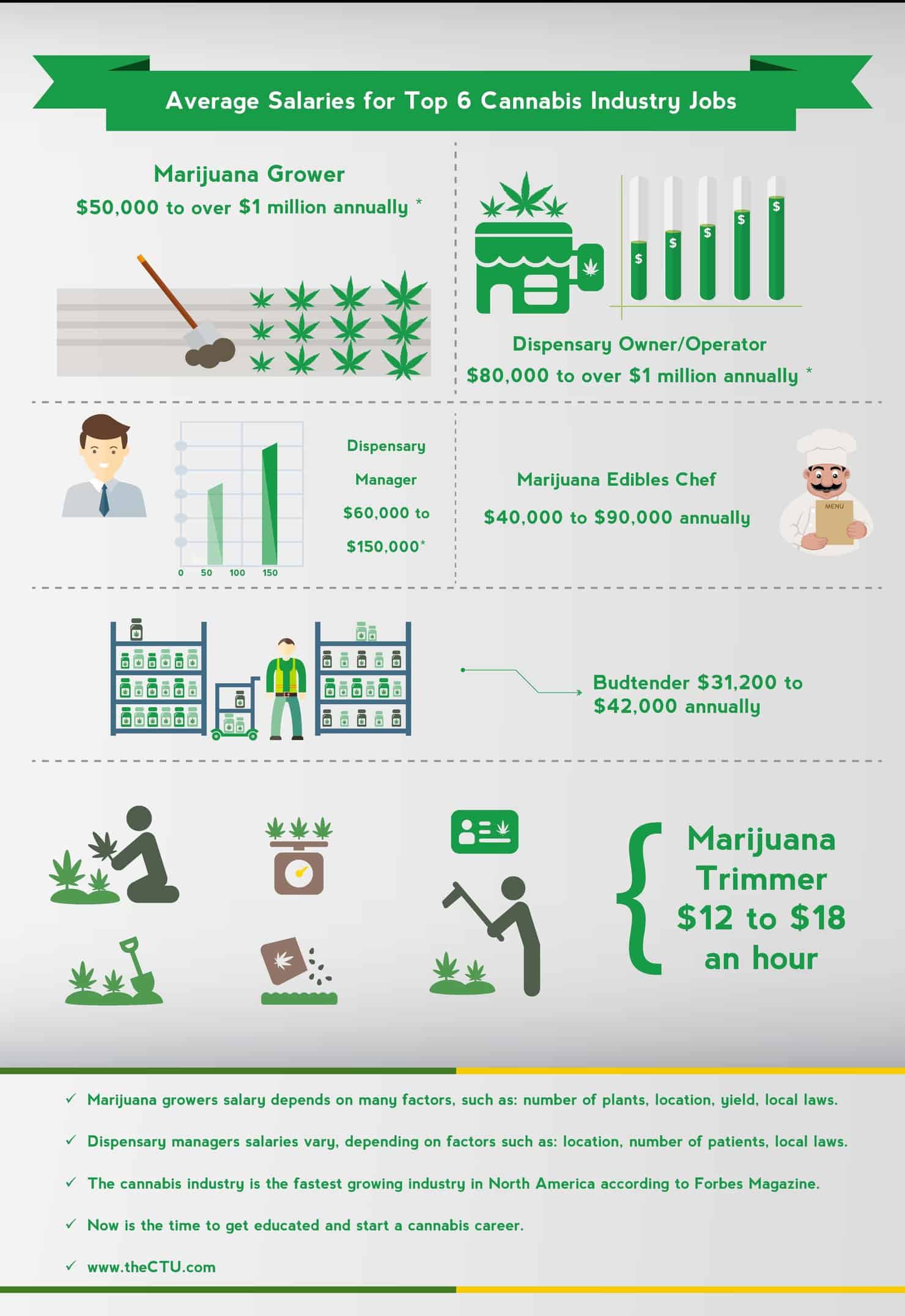
Just about anyone can find a job they love in the cannabis industry. The industry supports a variety of traditional occupations in agriculture, hospitality, customer service, retail, education, government, healthcare, information technology (IT), chemistry, and more.
Whether you just graduated high school or you’re putting the finishing touches on your dissertation for that long-awaited Ph.D., the cannabis industry has a job for you.
But what kind of salaries do cannabis industry employees make? Is it a good financial move to switch to the cannabis industry?
You might be shocked at how much you can make in your first year in the marijuana industry. For the most part, cannabis salaries are higher those of similar positions in non-cannabis industry jobs. In fact, on average, cannabis industry workers earn 11 percent more than the US median salary.
That depends on where you live and what you do, though. Like all industries, cannabis job salaries depend on location, education, and experience level. If you live in an area with a lower cost of living, you can expect a lower salary. However, if that area is an emerging cannabis market, you might make more than average.
ZipRecruiter tracks job salaries for specific job markets. The following table will give you an idea of salary differences in select cannabis job markets. To give you an idea of job availability, the table also provides the number of job listings on that website for each listed area on one day in January 2023. The area with the highest average annual salary is listed first, and the area with the lowest average annual salary is listed last.
| Geographical Area | Annual Salary (Lowest 25%) | Annual Salary (Middle 50%) | Annual Salary (Highest 25%) | Listings on 1/28/2023 |
| Sacramento, CA | $31,576 | $67,049 | $72,317 | 67 |
| Oakland, CA | $34,674 | $66,905 | $79,414 | 161 |
| Seattle, WA | $33,653 | $65,011 | $77,078 | 63 |
| Chicago, IL | $31,734 | $62,013 | $72,681 | 85 |
| New York, NY | $34,002 | $61,932 | $77,877 | 87 |
| Detroit, MI | $30,807 | $60,546 | $70,558 | 86 |
| Boston, MA | $33,488 | $60,319 | $76,699 | 135 |
| Philadelphia, PA | $30,924 | $60,132 | $70,826 | 53 |
| Los Angeles, CA | $32,822 | $57,371 | $75,175 | 272 |
| Tulsa, OK | $28,107 | $57,274 | $64,374 | 25 |
| Spokane, WA | $29,442 | $56,877 | $67,432 | 16 |
| Denver, CO | $31,233 | $56,364 | $71,534 | 127 |
| Arizona (all) | $28,803 | $55,383 | $65,968 | 82 |
| Cleveland, OH | $29,159 | $54,002 | $66,783 | 24 |
| Georgia (all) | $27,786 | $53,427 | $63,369 | 39 |
| Grand Rapids, MI | $29,203 | $53,020 | $66,884 | 15 |
| Pueblo, CO | $29,320 | $52,836 | $67,152 | 24 |
| Portland, OR | $30,950 | $52,535 | $70,886 | 80 |
| Florida (all) | $26,189 | $50,354 | $59,931 | 151 |
Salaries aren’t the only thing to consider when looking for a cannabis job. As the industry matures, more and more cannabis companies are offering competitive benefits to attract top talent.
Cannabis Job Opportunities by State
As of September 2023, 75% of US states had some form of legalized medical or recreational cannabis or hemp program. That percentage will only increase in 2023 and beyond.
When you’re looking for a cannabis job, keep in mind that most are concentrated in large cities in legal states. To give you an idea of this, we took a snapshot of cannabis jobs listings on Indeed for one day in June 2023.
The snapshot showed that Denver, CO (356 listings), Los Angeles, CA (337 listings), and Chicago, IL (167 listings) had the most cannabis-related listings in the US.
This was followed closely by Las Vegas, NV (163 listings), Portland, OR (153 listings), and Sacramento, CA (145 listings). Notably, the website listed 158 remote job openings in the cannabis industry on that day.
Although jobs remain concentrated in cities, some states have more job opportunities than others. Here’s a quick overview of the number of people employed by the cannabis industry in the top 10 states based on 2022 statistics:

- California – 57,970 cannabis jobs
- Colorado – 35,539 cannabis jobs
- Florida – 31,444 cannabis jobs
- Arizona – 20,728 cannabis jobs
- Washington – 19,873 cannabis jobs
- Michigan – 18,078 cannabis jobs
- Oregon – 17,981 cannabis jobs
- Illinois – 16,837 cannabis jobs
- Oklahoma – 16,759 cannabis jobs
- Pennsylvania – cannabis 15,895 jobs
Let’s take a closer look at cannabis industry jobs in those states.
Cannabis Jobs in California

Although California wasn’t the first state to go legal for recreational use, the cannabis industry has thrived there for decades. Cannabis is an intrinsic part of California culture.
California generated $5.1 billion in legal cannabis sales in 2022 and supported 57,970 cannabis jobs. Nearly 24,000 new cannabis jobs were created last year. As California customers continue to migrate from the black market to the legal market, legal job opportunities have significantly increased.
The California areas with the most cannabis industry jobs are Los Angeles, Sacramento, Oakland, and San Francisco. Let’s take a closer look.
California is no stranger to the cannabis industry. As of 2023, California has become one of the most progressive states when it comes to cannabis legalization and regulation. California has been a leader in cannabis law since 1996, when it passed Proposition 215—the first law in the United States that legalized medical marijuana on a statewide level.
Since then, California has made many strides towards comprehensive adult-use or recreational cannabis laws. In 2016, California passed Proposition 64 which legalized adult-use marijuana, making California the fifth state in the country to permit recreational cannabis consumption and sales.
The current laws regarding California’s cannabis industry are complex and stringent but have opened up new employment and business opportunities for aspiring entrepreneurs looking to get involved with this booming industry. Currently, California’s cannabis industry is estimated to be worth over $7 billion by 2024.
In California, individuals must be 21 years old or older to purchase adult-use marijuana from any licensed dispensary or retail store. Although medical marijuana was legalized much earlier than recreational marijuana, California created separate licensing regulations for medical marijuana dispensaries and recreational retailers. Similarly, California also distinguishes between different types of cultivation licenses for either medical or recreational growers as well as microbusiness/manufacturing licenses for processors who produce edibles or other infused products.
Cannabis businesses can either be licensed as “commercial” entities operating at a local (city) level or “non-commercial” entities operating only at a county level within California due to local regulations concerning the going rate for taxes on commercial vendors versus non-commercial vendors.
California has also implemented an online system called CA Cannabis Portal which facilitates communication between state agencies including public safety departments, taxation authorities and Department of Public Health as well as providing access to digital applications and license tracking services for businesses who wish to enter the California cannabis market legally.
As far as career opportunities in California's legal cannabis market go, there are many paths available depending on one's individual skillset: budtenders working in dispensaries; trimmers employed by cultivators; edibles makers working in manufacturing operations; marketing professionals creating campaigns; dispensary security doing rounds; lawyers helping legitimate businesses comply with regulations; lab technicians testing product quality; accountants managing finances; delivery drivers distributing products around town – just to name some of them!
Furthermore, employers must adhere to labor laws requiring them to provide fair wages along with benefits such as health insurance and vacation time in order accommodate job seekers entering this expanding marketplace.
In addition to employment opportunities available through traditional channels such as dispensaries and cultivators, there are many additional business prospects in the form of investments into start-ups and other high growth ventures related to the cannabis sector including technology companies developing apps related to product ordering/delivery systems or analytics programs designed for data collection/report generation purposes etc.
Private equity investors getting involved with existing companies or suppliers offering equipment such as lights/growing systems etc., real estate brokerages helping owners find/lease appropriate properties suitable for cultivation sites etc., media outlets covering news stories relevant within this new field along with financial advisors overseeing portfolios made up primarily of securities issued by publicly traded companies operating within this space etc..
With constantly changing regulations and laws governing this dynamic sector it is important that interested parties stay informed about potential risks associated with participating while simultaneously utilizing existing resources at their disposal so they can properly capitalize on any available job market openings that may open up over time!
Cannabis Jobs in Los Angeles
Over 200 cannabis retailers are currently authorized to operate in Los Angeles, with even more located in the greater Los Angeles area. More than half of those retailers opened their businesses in the past two years.
This means plenty of job opportunities in LA for cannabis budtenders and dispensary managers. New job openings are available in the cultivation and manufacturing sectors that serve those dispensaries.
The Los Angeles cannabis industry is booming, and those looking to take advantage of this new opportunity need to understand the laws that govern it.
Firstly, Los Angeles dispensaries are prohibited from selling or providing any cannabis product that has not been tested and approved by the Los Angeles Department of Health Services (LADHS). The LADHS also sets limits on how much THC can be present in a particular product for sale.
All products must be labeled with the appropriate amount of THC per serving as well as any other information required by law. Additionally, Los Angeles dispensaries are required to maintain records of all sales and be able to produce these upon request from the LADHS.
Furthermore, Los Angeles dispensaries must ensure their employees have valid permits issued by the California Bureau of Cannabis Control (BCC). These permits are necessary for employees who handle cannabis products such as budtenders or store clerks. Additionally, any employee who helps cultivate or manufacture cannabis products must have a valid permit issued by the BCC.
In terms of job opportunities in Los Angeles, there is a wide range of positions available within the legal cannabis market. In addition to budtenders and store clerks, roles may include trimmers, extractors, growers, edibles chefs or food preparation staff, delivery personnel and security guards.
Furthermore, those with experience in accounting and marketing can find roles such as bookkeepers and marketers. Overall it’s estimated Los Angeles currently employs over 20 thousand people within its legal cannabis industry.
It's essential for potential job seekers in Los Angeles' cannabis industry to stay up-to-date on all relevant local laws pertaining to this market. Companies will typically require their employees possess a working knowledge of local regulations before they hire them on full-time or part-time basis.
This ensures compliance with local health codes and safety regulations while ensuring workers safety and rights are not violated while they are employed at a Los Angeles dispensary or other type of cannabis business establishment operating in California's largest city.
Los Angeles has taken great strides in creating a safe environment for those looking to start careers within its thriving legal marijuana market but potential workers should always do their due diligence when considering these types of jobs so as ensure they fully understand all relevant laws before commencing employment within this sector.
Cannabis Jobs in Sacramento
In November 2020, the Sacramento City Council added 10 new permits for storefront dispensaries, increasing the number from 30 to 40. That number doesn’t include retail cannabis delivery businesses. With business applications still available for cultivation, manufacturing, and other cannabis businesses, this is a great time to look for a cannabis job in Sacramento!
Sacramento, California has become a hub for cannabis-related businesses and jobs, as of 2023. Currently, Sacramento is home to over 130 licensed dispensaries and delivery services that serve both medical and adult-use customers. This number is expected to increase in the coming years as cannabis continues to be decriminalized and regulated by the state of California.
Cannabis laws in Sacramento are constantly evolving with the changing landscape of the industry. As such, those looking to enter Sacramento’s cannabis job market should stay up-to-date on changes in local regulations. Generally speaking, Sacramento’s cannabis laws allow individuals aged 21 years or older to legally purchase and possess up to 1 ounce of marijuana flower or 8 grams of concentrated marijuana for personal use.
Additionally, Sacramento has allowed for the cultivation of up to 6 plants per person at a private residence; however, if more than one adult lives at home then no more than 12 total plants can be cultivated on the property. Furthermore, Sacramento has made it illegal for any person or business to operate or participate in the sale of cannabis without proper licensing from the state government.
Those looking for a job in Sacramento's burgeoning cannabis industry should consider becoming a budtender. Budtenders serve as frontline workers in dispensaries and provide customers with information about products available for purchase along with advice on which products best meet their needs.
Budtenders must understand product strain characteristics and have knowledge about how each product affects a customer differently based on their unique needs.
A good budtender will also understand Sacramento’s local regulations regarding recreational or medicinal use so they can accurately advise customers on uses that are compliant within local law. Additionally, budtenders must have strong sales skills so they can effectively market products within their dispensary while striving to meet monthly sales targets set by management teams.
In addition to budtending positions, Sacramento is also home to numerous other jobs related to the cannabis industry such as trimmers who prepare plants for sale; security personnel responsible for protecting products from theft; delivery drivers that transport goods directly from cultivators; extraction technicians who extract oils from plants; accountants who manage budgets and finances for businesses; lab technicians that test product quality; marketing professionals responsible for creating promotional campaigns; graphic designers who create visual content; and many more!
With such a broad range of jobs available in Sacramento’s growing cannabis sector there is sure to be something out there suited for everyone’s skill set and interests!
Cannabis Jobs in Oakland
Although only 16 dispensaries were open in Oakland as of August 2023, 13 more were conditionally approved. That means dispensary jobs are set to double in Oakland in the near future. With Oakland cannabis business license applications available in every major cannabis industry sector, job opportunities are expected to increase through 2023 and beyond.
Oakland, California is a leading state in the cannabis industry and has been since the passing of Proposition 64 in 2016. Oakland was one of the first cities to establish a cannabis ordinance, which allowed for legal retail cannabis sales beginning in 2019.
Today, Oakland's cannabis laws are among the most progressive in the nation. Oakland's regulations focus on social equity, providing opportunities for local residents who have been disproportionately impacted by the War on Drugs, while also creating a safe and regulated environment for cannabis businesses.
In Oakland, adults 21 years of age or older may legally possess, transport, purchase and consume up to 28.5 grams of recreational marijuana (or 8 grams of concentrated marijuana) without penalty or arrest. Adults may also grow up to six plants per residence or 12 per parcel as long as they are kept out of public view; Oakland has no limits on how much product may be grown outdoors.
Retailers must obtain both a state license and an Oakland permit before being able to open their doors for business. Oakland permits may be granted to those with an existing medical license or a newly-applied for recreational license operated by either individuals or entities such as non-profits or corporations that have at least 51% ownership from Oakland residents who have lived there for at least two years prior to submitting their application.
The City of Oakland provides various incentives and resources like free training programs and workshops so that applicants can better understand what it takes to become licensed and succeed in the industry.
For example, Oakland’s Cannabis Equity Program offers free technical assistance grants, mentoring programs for entrepreneurs from low-income neighborhoods that have been disproportionately impacted by marijuana criminalization laws, direct loan funds through its Community Reinvestment program, workforce development initiatives like job fairs targeted towards reentry populations and access to affordable financing programs like Oakland’s Opportunity Fund Small Business Loan Program specifically designed for small businesses operating within Oakland city limits.
In terms of employment opportunities within Oakland's cannabis industry, there is no lack of opportunity! Job seekers can find work as growers cultivating plants at indoor warehouses; trimmers sorting buds after harvest; budtenders selling products behind dispensary counters; security personnel ensuring premises stay safe; edible makers crafting delicious treats infused with THC; extractors extracting resin from plants through various processes; distributors delivering products throughout California; accountants handling financial records; marketers advertising products online & offline; lab technicians testing samples for potency & contaminants; software developers creating apps & websites tailored towards consumers needs; lawyers navigating legal complexities surrounding cannabis law & policy reform.
With Oakland’s thriving economy centered around marijuana legalization & decriminalization efforts coupled with generous resources provided by government organizations it is clear why so many people flock here seeking cannabis employment opportunities within this rapidly evolving field! So if you're looking for an exciting new career path that promises abundant professional growth potential then look no further than right here in sunny Oakland – The Cannabis Capital Of The West Coast!
Cannabis Jobs in San Francisco
San Francisco, California has been a leader in cannabis reform for many years and has enacted many progressive laws and regulations to facilitate the growth of the cannabis industry. San Francisco's cannabis laws have been continually evolving since the passage of legalization in 2016 and San Francisco is now one of the most progressive cities in America with regards to cannabis reform.
In San Francisco, adults 21 years of age and older are allowed to possess up to 28.5 grams (1 ounce) of cannabis flower or 8 grams of concentrated cannabis products, such as oil or wax. San Franciscans may also grow up to six plants – either indoors or outdoors – in their home, as long as they are not visible from public view. San Franciscans can give away up to 28.5 grams (1 ounce) of marijuana, but it is still illegal to sell it without a license issued by San Francisco’s Office of Cannabis.
The San Francisco Department of Public Health has issued over 80 licenses for medical dispensaries since 2018, allowing those with a valid doctor's recommendation to purchase medical cannabis legally. San Francisco residents may also purchase recreational marijuana from dispensaries licensed by San Francisco’s Office of Cannabis provided that they are 21 years old or older and have valid ID.
The San Francisco job market for those interested in working within the cannabis industry is expanding rapidly – from budtenders and dispensary managers to scientists researching new products and regulations experts helping businesses navigate this ever changing landscape. In order to work in the industry, potential employees will need to pass certain requirements set forth by San Francisco’s Office of Cannabis including background checks, drug screenings, and other tests depending on the position sought. The current outlook for these jobs looks positive; due to the size of San Francisco’s population and its active involvement in the industry there are numerous opportunities available right now throughout San Francisco County itself as well as other parts of California where medical marijuana is legal.
For those looking into setting up their own business within this burgeoning sector, several resources are available through San Francisco’s Office Of Cannabis that can provide valuable information on how best to go about securing a license as well as what regulations must be followed once your business is operational. Additionally, The City Of San Fransisco's Small Business Development Center offers a range courses autodly designed for entrepreneurs interested in starting their own cannabusinesses which provides insight into every element needed when embarking on this type entrepreneurial endeavor – such as financing options and navigating local/state regulations – so that you can be sure your cannabusiness remains compliant while avoiding any costly missteps along the way.
Overall, San Fransisco continues its role at leading edge towards responsible regulation while allowing businesses to thrive with its booming market demand for legal accessible marijuana products; making it an exciting time for both businesses seeking entrance into this space ,as well as individuals looking forward to joining this vibrant industry with endless opportunities await!
If you want to work in the cannabis industry in California attend the California Cannabis School of choice.
Cannabis Jobs in Colorado
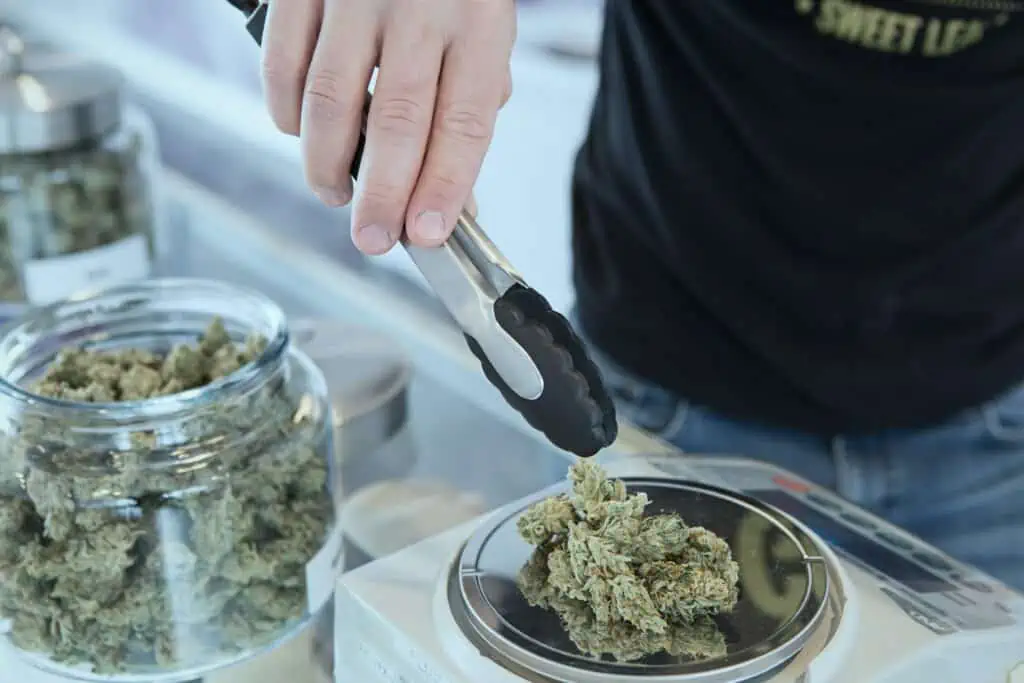
Colorado has more cannabis businesses than any other state. In 2022, Colorado supported more than 45,000 full-time cannabis jobs. The Colorado cannabis industry continues to grow steadily.
That said, the Colorado industry has stabilized over the last 6 years. Although there is still a modest annual job increase, but it’s nothing like the job growth in emerging markets. If you want to start at the ground floor of a new sector, look to consumption lounges and delivery services—both of those sectors are new and expanding in the Colorado market.
The most Colorado cannabis job openings are in Denver. A limited number of job openings can also be found in Aurora, Boulder, Pueblo, Colorado Springs, Trinidad, and Fort Collins.
Colorado residents enjoy some of the most comprehensive cannabis laws in the country. Colorado's progressive approach to legalizing marijuana has created an exciting job market with many opportunities for those looking to get involved in the industry.
When it comes to the medical side of Colorado cannabis, qualified patients and caregivers are able to obtain a Colorado MED badge from the Colorado Department of Public Health and Environment (CDPHE). The Colorado MED badge authorizes individuals to purchase and possess up to 2 ounces of flower or 8 ounces of marijuana-infused products per month from licensed dispensaries. Patients who have been diagnosed with debilitating medical conditions such as cancer, glaucoma, HIV/AIDS, PTSD, Crohn’s disease, severe pain, seizures, or chronic nausea may be eligible for a Colorado MED badge. Physicians must provide written certification that they believe their patient would benefit from medical marijuana treatment before they can receive their Colorado MED Badge.
For recreational users 21 years or older in Colorado, there are no restrictions on how much marijuana you can buy or possess at one time – but there are still rules put into place by the state government which you should be aware of. For example, all purchases must be made at licensed retail marijuana stores and buyers are limited to 1 ounce (28 grams) per transaction – regardless of how much money was spent. It is also important to note that it remains illegal to smoke marijuana in public places like parks and streets – even if it was legally purchased from a licensed store.
The job market for cannabis related careers in Colorado has grown exponentially since its legalization over 5 years ago. Those interested in exploring potential employment options should consider roles such as budtender positions at dispensaries; grower/cultivation manager; sales representative; extraction technician; delivery driver; compliance specialist; laboratory technician; edibles maker; packaging & labelling specialist; cannabinoid analyst; master grower/director/supervisor; dispensary manager among many others!
Cannabis professionals are highly sought after due to their unique set of skills – making them invaluable assets within the industry. There is also an abundance of educational resources available online which offer more information about specific job requirements as well as training courses and certifications available through the only IACET/ANSI internationally accredited cannabis college, Cannabis Training University.
Whether you are interested in getting involved with cannabis professionally or just want to learn more about Colorado's cannabis laws – understanding these regulations is key when navigating this growing industry. Those looking for employment opportunities should become familiar with local laws and regulations surrounding cannabis use before pursuing any type of career path within this sector.
Cannabis Jobs in Denver
If you’re looking for a cannabis job in Denver, make sure you’re at the top of your game. Although Denver has a lot of cannabis cultivation and extraction facilities, you’ll find that you’re competing with the best of the best for the available jobs.
Colorado broke its own record in 2021 when it hit the $2.2 billion mark in legal cannabis sales. As demand for cannabis continues to grow, there is an equally increased demand for labor.
Denver, Colorado has become one of the most progressive cities in the nation when it comes to cannabis laws. As of 2023, Denver has legalized both medicinal and recreational use of cannabis.
For those looking to work in the cannabis industry, Denver is a great place to start. The city offers plenty of dispensary-related jobs, such as budtender jobs at dispensaries or MED badge positions under the Colorado Department of Revenue's Medical Enforcement Division (MED).
MED badge holders are responsible for ensuring that all medical marijuana activities are conducted in accordance with state law.
In addition to dispensary-related positions, Denver also offers an array of other cannabis job opportunities such as legal consultants, marketing directors, compliance officers and even research and development specialists.
To be eligible for these cannabis positions, individuals need to obtain either a doctor's recommendation or a Colorado medical marijuana card. Individuals must also pass a criminal background check in order to be approved for any marijuana-related position in Denver.
Though Denver has relaxed its laws on recreational use of cannabis, the city still maintains strict regulations on the sale and cultivation of cannabis products.
All commercial activity involving cannabis must adhere to local zoning laws and obtain licensing from the City and County of Denver (CCD). Additionally, dispensaries must also maintain an inventory tracking system and abide by strict labeling requirements set forth by CCD.
Overall, Denver is an excellent place for anyone looking to enter into the ever-growing cannabis industry. With more relaxed regulations on recreational use along with plenty of job opportunities available throughout the city, it’s no wonder why so many people are flocking to Denver to pursue their dreams in this budding cannabis industry.
Cannabis Jobs in Pueblo
If you want a cannabis cultivation job, look no further than Pueblo, Colorado. After Denver, Pueblo is the second biggest cannabis cultivator in the state. A mecca for both indoor and outdoor cannabis cultivation businesses, 5 percent of Pueblo county’s workforce is employed in the cannabis industry. Maybe that’s why Pueblo is sometimes called the “Napa Valley of Weed.”
Pueblo, Colorado has seen a surge in the cannabis industry over the past few years. With medical and recreational cannabis now legal in the state of Colorado, Pueblo has become a hub for cannabis businesses and employment opportunities alike.
As of 2023, anyone wishing to grow or cultivate cannabis in Pueblo is required to obtain a cultivation license from either the state or city, depending on where they are located within Pueblo.
In order to obtain this cultivation license, applicants must meet certain criteria such as having a valid Colorado driver's license or ID card, being at least 21 years old, passing an extensive background check, and having sufficient financial resources to support their cannabis business.
Furthermore, all applicants must adhere to local regulations regarding water usage and other environmental considerations. Additionally, outdoor cultivation of cannabis is only allowed in certain areas throughout Pueblo.
For those interested in obtaining a cultivation license in Pueblo there are numerous job opportunities available within this burgeoning sector. Most commonly sought after positions include master growers who oversee cultivation operations as well as trimmers who trim down harvested plants and weigh out precise quantities for sale.
Other positions include budtenders who assist customers with strain selection and provide customer service within dispensaries as well as compliance specialists who make sure that all company policies and procedures are followed.
The current job market for cannabis jobs in Pueblo is highly competitive due to the wide variety of applicants with varying levels of experience and expertise looking for work in the industry. Those who possess demonstrable experience and education from Cannabis Training University both inside and outside of the cannabis industry typically have an edge over those who lack related skillsets or knowledge when applying for jobs with local companies like dispensaries or production facilities alike.
Therefore it is essential that applicants take any opportunity available to get informed about both the practical side of working within this industry as well as familiarizing themselves with compliance requirements applicable to their particular position so that they can stand out from the crowd when applying for jobs within the industry.
Overall Pueblo is quickly becoming one of Colorado’s hottest markets when it comes to embracing new developments within the legal marijuana sector; however similar to any other job market an applicant needs tangible experience if they wish to be successful while searching for employment opportunities in this growing area of business.
Cannabis Jobs in Florida
For a state with only a medical program, the Florida cannabis industry is growing surprisingly quickly. The number of registered patients increased more than 50% in 2022. Now, Florida dispensaries sell more cannabis products than any other state except Colorado and California. This could double if Florida decides to legalize recreational cannabis.
With new patients comes new industry jobs to support them. Florida already has more than 31,000 full-time cannabis employees. Expect to see increased job openings in all sectors of the Florida cannabis industry in 2023 and beyond.
Many of these jobs will be offered by Florida’s largest cannabis corporations: Trulieve, Surterra, and Curaleaf. Let’s take a closer look at these companies.
In 2014, Florida voters approved Amendment 2, which allows the medical use of marijuana by qualified patients with debilitating medical conditions. Today, Florida has one of the most expansive medical marijuana programs in the country, with more than 300,000 registered patients and over 1,400 licensed dispensaries throughout the state.
Since then, Florida legislators have enacted a number of bills to further expand access to medical marijuana. This includes allowing out-of-state visitors to purchase products from Florida dispensaries as well as lenient restrictions on home cultivation for qualified patients. Florida also allows for “smokable flower” consumption for medical marijuana users, and at least 100 different strains are available for purchase in Florida dispensaries.
However, Florida has yet to legalize recreational marijuana use or sales in the state. Nevertheless, Florida does allow individuals 21 and older to possess up to 2.5 ounces of flower and 0.75 ounces of concentrates without penalty – though any amount above that could lead to felony charges.
In terms of job opportunities in Florida’s cannabis industry, there are plenty! With the large number of dispensaries operating in the state, there is no shortage of budtender positions available – requiring interesting customer service skills such as knowledge in THC/CBD content levels or different strains types and effects on customers, all of which is learned at Cannabis Training University.
Dispensaries may also hire security staff for their premises or trimmers for physical labor tasks such as cutting down plants or cleaning buds before packaging them for sale. Because Florida still hasn't legalized recreational marijuana use yet however, there aren't many growth opportunities outside dispensary locations that would involve cultivating or selling products directly to consumers due to legal reasons.
Overall, while Florida hasn't legalized recreational marijuana just yet – it has made great progress expanding its medical marijuana program over the past few years!
Those looking for job opportunities within this growing industry should definitely take advantage – whether it be through applying at existing dispensaries & grow operations around town or taking your career even further with specializations such medical coaching or becoming an MMJ doctor yourself!
Enroll at the Florida marijuana school of choice if you want to stand apart and land yourself a cannabis job in FL.
Cannabis Jobs at Trulieve
Many of the cannabis-industry job openings in Florida are in Quincy—the headquarters of Trulieve. One of the biggest cannabis companies in the United States, Trulieve holds 51% of the cannabis market share in Florida. 82 of Trulieve’s 87 dispensaries are in the Sunshine State.
In addition to traditional cannabis sector jobs, Trulieve hires electrical technicians, control specialists, delivery coordinators, accountants, and other mainstream job roles.
Trulieve is one of the leading medical cannabis dispensaries in Florida, offering patients a high quality selection of products and services. Trulieve's mission is to ensure that qualified patients have access to safe, reliable medicine through its various locations throughout the state.
Trulieve has a number of dispensary locations situated throughout Florida, including Tampa, Miami-Dade County, Orlando, and Jacksonville. Trulieve strives to provide customers with a wonderful experience each time they visit their dispensaries.
Trulieve's wide array of products includes an assortment of medical cannabis flower strains, tinctures, vape cartridges, edibles, capsules and concentrates that are tailored to meet specific patient needs.
Trulieve currently offers positions for budtenders at all its dispensary locations throughout Florida which involve customer service responsibilities such as helping customers select the right products based on their individual needs or preferences and accurately measuring doses for these products according to physician recommendations or customer requests as well as general administrative duties associated with running a dispensary smoothly.
Those interested in working at Trulieve should possess excellent communication skills, be knowledgeable about medical marijuana products and regulations governing its use in Florida, be friendly and customer service oriented, be detail-oriented to accurately measure doses for different customers’ needs or preferences and have basic computer skills.
The Trulieve brand is highly respected amongst local lawmakers due to its commitment to quality assurance standards across all levels – from product testing protocols through staff education programs – which demonstrates a dedication towards creating an environment where customers can confidently purchase safe medicinal marijuana products while adhering to strict safety guidelines set forth by the state legislature association (FLSA).
Additionally due to its wide array of available job opportunities at multiple locations throughout Florida Trulieve presents potential employees with unique opportunities available nowhere else in order deliver quality care with compassion while expanding your own professional horizons through gainful employment with one of the top medical cannabis companies currently operating within Florida.
Cannabis Jobs at Surterra
Surterra, a privately held cannabis company, operates 17% of Florida’s dispensaries. Job seekers can apply at any of 39 retail locations spread throughout the state, including the panhandle and smaller cities.
Surterra is one of the leading, medical cannabis companies in Florida, with multiple dispensaries throughout the state. Surterra's mission is to provide patients with natural relief through its products and services.
Surterra creates a comprehensive cannabis experience for its customers, from products to services. Surterra provides a variety of products tailored to individual needs and preferences, including oils, vapes, capsules, topical creams and tinctures.
Surterra’s range of cannabis products are created with the highest quality ingredients and are carefully crafted by Surterra’s team of experts in order to ensure effectiveness and safety.
In addition to providing top-notch cannabis products, Surterra also offers a wide array of services designed to help patients get the most out of their cannabis journey. Surterrra has an education center where customers can learn more about the science behind cannabis and how it can be used medically.
The company also offers healthcare advice from certified medical professionals as well as educational programs for medical professionals looking to understand how best to treat their patients with medical marijuana.
Surterra even provides in-home delivery options for those who cannot make it out to one of their dispensaries or need help finding the right product for their specific needs.
Surterra has several locations throughout Florida that customers can visit when searching for products or information on cannabis usage. Their locations include Tallahassee, Tampa/St Petersburg, Miami/Ft Lauderdale and Palm Beach County areas as well as Orlando/Kissimmee region among others.
In addition Surterra has several job opportunities available at each dispensary location ranging from customer service representatives to store managers and even general counsel positions which provide a great opportunity for those interested in getting involved with this rapidly growing industry here in Florida. Get certified with a Budtender Certification to stand out amongst applicants!
Surterra is committed to providing safe access to high quality medicinal marijuana while helping empower people through education so they can make informed decisions about their health care choices.
Cannabis Jobs at Curaleaf
Curaleaf, one of the largest cannabis companies in the United States, operates retail cannabis dispensaries throughout the United States. More than a third of these dispensaries are in Florida. With 36 retail locations, it’s safe to say that Curaleaf is one of the top cannabis-industry employers in Florida.
That said, Curaleaf is not your best bet if you live in the Florida panhandle or other rural areas. Curaleaf’s dispensaries are mostly concentrated in the larger cities on the peninsula.
Curaleaf is one of the leading marijuana dispensaries in Florida. Established in 2018, Curaleaf has quickly become a leader in delivering quality cannabis products and services to the state. Curaleaf's dispensaries offer an extensive selection of marijuana flower, concentrates, edibles, CBD products, and more to meet the needs of their customers.
Curaleaf prides itself on providing a safe and inviting atmosphere for its customers with knowledgeable staff that are always willing to answer questions or help make selections. Curaleaf dispensaries are also dedicated to educating patients on the medical benefits of cannabis and helping individuals access medical marijuana legally with valid recommendations from physicians.
In addition to providing top-notch service at their dispensary locations, Curaleaf offers a wide range of job opportunities for those interested in working in the cannabis industry.
Curaleaf currently employs over 300 people across its various Florida locations, including budtenders who are responsible for handling customer inquiries and transactions; growmasters that cultivate quality cannabis plants; extraction technicians skilled in making extracts; delivery drivers who transport orders safely and securely; security personnel that maintain safety inside and outside Curaleaf’s dispensaries; retail associates that ensure shelves are stocked with merchandise; and even upper management positions like directors of security or operations.
Curaleaf prides itself on offering competitive pay with benefits such as health insurance for eligible employees.
For those looking for work in the legal cannabis industry in Florida, Curaleaf is an excellent place to start. With a comprehensive selection of jobs ranging from entry-level budtender positions to experienced management roles, Curaleaf provides individuals with ample opportunity to build their career within the ever evolving landscape of legalized marijuana.
Whether you're new to the cannabis industry or an expert attorney looking for an exciting opportunity in a fast-growing field, Curaleaf has something for everyone!
Cannabis Jobs in Arizona
Medical sales in Arizona topped $1.4 billion in 2022. With recreational cannabis now legal in the state, sales could double in 2023. Arizona is now reviewing thousands of applicants for dispensary, cultivation, extraction, and edible manufacturing business licenses.
With new businesses comes new jobs. Arizona added more than 5,000 cannabis-industry jobs in 2021. That will only increase in 2023 and beyond! That makes Arizona one of the hottest destinations for anyone looking to nab a cannabis job.
Arizona is home to some of the most progressive cannabis laws in the United States. As of 2023, adults over the age of 21 in Arizona will be able to possess and use up to one ounce of marijuana legally. Cannabis products such as edibles, concentrates and topicals are also now available for purchase in licensed dispensaries throughout the state.
The legalization of adult-use cannabis has created a dynamic job market for those interested in working in this flourishing industry. Cannabis jobs include budtenders, inventory managers, dispensary managers, delivery drivers, extraction technicians, and more.
Many cities within Arizona are also creating Cannabis-related jobs such as medical professionals and Cannabis law enforcement officers.
For those looking to start their career in Cannabis, it is important to understand the regulations that govern this new industry in Arizona. All Cannabis employees must go through the proper licensing process before they can work at any dispensary or cultivation facilities around the state. To obtain a Cannabis license from the Arizona Department of Health Services (DHS), an individual must complete a background check that includes submitting fingerprints and having a valid identification card or driver’s license.
After obtaining their Cannabis license, individuals are expected to abide by all local and state laws regarding Cannabis production and sale.
Cannabis businesses are also required to follow all applicable tax laws when operating their business operations. Cannabis businesses may be required to pay certain taxes on their revenue as well as other applicable taxes based on the type of products they carry or services they offer.
With proper advice from an experienced cannabis attorneys at Cannabis Training University, Cannabis business owners can ensure that they are compliant with all applicable laws while conducting business operations responsibly and ethically.
Having an understanding of both local regulations along with general knowledge about how plants can be cultivated properly can be extremely beneficial when seeking out a job within Arizona's Cannabis industry today.
As legal access continues expanding across America in 2023, it is clear that many opportunities await individuals interested in working within this growing industry here in Arizona – especially those who come prepared with necessary information related both locally specific regulations as well as general knowledge about Cannabis production/sale processes & medicinal benefits associated with it!
Cannabis Jobs in Washington State
The cannabis industry in Washington state continues to grow at a relatively slow and steady pace. Purchases increased from $1.21 billion in 2021 to $1.42 billion in 2022, with the state adding 524 cannabis jobs!
Although growth is slow, Washington is your state if you want to work in a stable, fully mainstreamed, cannabis industry. You’ll find the most Washington state job openings in Seattle and Spokane.
Washington is a pioneer in cannabis legalization, and with the passage of Initiative 502 in 2012, Washington has become one of the most progressive states in terms of cannabis laws.
Washington's recreational marijuana law allows adults 21 and older to possess up to one ounce of usable marijuana flower, 16 ounces of solid edibles infused with marijuana, 72 ounces of liquid edibles infused with marijuana, and 7 grams of marijuana concentrate. Washington also permits residents to grow up to six plants for personal use at home as long as no more than four are mature or flowering at any given time.
In Washington, there is still a thriving market for medical-use cannabis products and activities related to them. Washington's Medical Cannabis endorsement program allows registered patients access to larger amounts of cannabis (up to three times the amount that recreational users are allowed) as well as higher potency products that cannot be sold in retail stores.
The Washington State Department of Health is responsible for managing the state’s medical marijuana program and issuing endorsements for qualified patients. Qualifying medical conditions include cancer, HIV/AIDS, glaucoma, Crohn’s disease, post-traumatic stress disorder (PTSD), intractable pain and other ailments that cause chronic symptoms that can be treated with cannabis products.
As more people learn about the benefits of using cannabis medically, Washington’s job market is expected to expand significantly over the next few years in order to meet this demand. Budtenders are employed at dispensaries in Washington State and serve customers by answering questions about different types of strains or other cannabinoid products available on site.
Budtender jobs often require knowledge about different strains of cannabis including indicas, sativas and hybrids as well as experience providing customer service skills including product advice in line with state regulations and restrictions, all of which are taught at Cannabis Training University in the budtender certification program.
Dispensary managers are responsible for overseeing day-to-day operations within a dispensary including hiring staff, ensuring compliance with all applicable laws and regulations pertaining to the sale and distribution of cannabis products while also handling customer inquiries regarding purchase options available within their store. This role requires a degree in business management or related field as well as previous retail experience along with an understanding of Washington’s existing cannabis laws. Those interested in how to open a dispensary in Washington can learn it all at CTU.
Cannabis Jobs in Michigan
Michigan’s first recreational cannabis store opened in December 2019. The state doubled both its revenue and its legal cannabis workforce in 2020 and it continues to grow annually.
Michigan’s recreational cannabis industry should continue to grow throughout 2023. Michigan cannabis job openings will be available primarily in the greater Detroit area, but also along the I-96 and I-94 corridors in cities like Marshall, Kalamazoo, Ann Arbor, Grand Rapids, Birmingham, and Lansing.
Michigan is quickly becoming one of the most popular places for cannabis jobs in 2023 and beyond. Michigan offers a plethora of career opportunities in the cannabis industry, from budtenders to dispensary owners.
Michigan is also making it easier for people to enter the cannabis industry with initiatives such as allowing home cultivation of up to 12 plants per household. With these initiatives, Michigan is providing more people access to the lucrative world of cannabis jobs.
For those looking to become budtenders in Michigan, the average salary can range between $235,000 and $45,000 annually.
This is slightly above the national average salary for similar positions but still competitive with other states that have legalized marijuana. Budtenders are responsible for helping customers understand different marijuana products, such as edibles and concentrates, as well as helping them find what product best suits their needs.
As for Michigan's cannabis laws in 2023, possession of up to 2.5 ounces of flower is allowed for those 21 years or older without any criminal charges attached. Michigan also allows Michigan residents to grow up to 12 plants at home for personal use only (no sales).
The state has implemented other regulations on retail stores such as limiting vertical integration by requiring separate licenses for each part of the supply chain (cultivation, processing/manufacturing, transportation/distribution).
Overall Michigan is making great strides towards creating an inviting environment for those looking to get into the cannabis business by providing ample job opportunities and favorable laws surrounding marijuana consumption and growth.
To land a cannabis job in MI make sure to enroll at the Michigan cannabis college of choice!
Cannabis Jobs in Oregon
Over the past few years, Oregon was famous for their oversupply of cannabis. However, in reality, some sectors of Oregon’s cannabis market have an undersupply of cannabis products. According to the 2021 Recreational Marijuana Supply and Demand Legislative Report, “…production has increased by 78% while the amount of cannabis sold increased by 150%…” since the 2019 report.
With demand catching up to supply, prices have stabilized. This led to 2022 sales in excess of $1 billion. The state added 687 new cannabis jobs in 2022 and is poised to add more in 2023. The vast majority of those Oregon weed jobs are in and around the greater Portland area.
The cannabis industry in Oregon has come a long way in the past decade. Oregon was one of the first states to legalize recreational marijuana, and since then, the state has seen an influx of cannabis-related jobs and businesses. The Oregon cannabis industry is growing rapidly, with hundreds of new job openings added every month.
Budtenders in Oregon can expect to make an average salary of $15 to $17 per hour, depending on experience and location. Budtender positions typically consist of customer service roles such as recommending products and helping customers understand the available options. With more experience, budtenders can expect to make up to $20 or more per hour.
In Oregon, adults aged 21 or older are allowed to cultivate up to four plants for personal use at home provided they remain out of public sight. Oregon also allows adults 21 and over to possess up to eight ounces of usable marijuana in their residence. Additionally, Oregon passed House Bill 3400 in 2019 that allows for industrial hemp cultivation throughout Oregon as well as the sale of hemp-derived products such as CBD oils and tinctures.
Oregon has some strict cannabis laws in place that must be followed by consumers, growers, sellers and other stakeholders. In 2023, those laws will still apply; however they may change over time based on new legislation or advancements within the industry itself.
Oregon’s cannabis laws include restrictions on who can purchase marijuana (it must be 21+), limitations on THC levels (no higher than 0.3%), extensive lab testing requirements for edibles and other infused products, bans on certain types of packaging (such as objects that could appeal to children) and limits on how much a person can purchase per day (one ounce).
Cannabis Training University is the top Oregon cannabis college with online career training programs including everything needed to begin a career in cannabis in Oregon.
Cannabis Jobs in Illinois
The Illinois cannabis industry is flourishing! With the implementation of the recreational cannabis program in 2020, cannabis jobs in Illinois more than doubled. Now nearly 17,000 cannabis workers are employed full-time in Illinois.
With the recent approval of 81 new dispensaries, job opportunities will only grow in 2023. The majority of Illinois cannabis job openings are in Chicago, although cannabis workers can also find employment in smaller cities like Barry, Oglesby, Lincoln, and Rockford.
Illinois is leading the way in cannabis law reform and creating a vibrant, ever-expanding job market with the implementation of legal recreational marijuana. In January of 2023, Illinois became the 11th state to fully legalize adult use of cannabis. The implementation of this law has opened countless opportunities for entrepreneurs, industry professionals, and individual consumers alike.
For those seeking an opportunity in the cannabis industry, there are now numerous paths to success in Illinois. For starters, there are industry-specific training courses and certifications available through the internationally accredited cannabis college, Cannabis Training University. Additionally, a great many industry jobs have been created in Illinois from growers and distributors to laboratory technicians and security personnel.
The Illinois cannabis industry is booming in 2023 and offers a wide variety of job opportunities for those looking to enter the field. From professional marijuana growers and budtenders, to laboratory technicians and security personnel, Illinois has something for everyone.
For those interested in becoming a budtender, Illinois offers competitive salaries averaging around $40,000 per year. Budtenders are responsible for helping customers select products from the variety of strains and products available in Illinois dispensaries while also offering their expert advice on usage, dosage, and safety. Budtenders must also ensure compliance with Illinois state regulations regarding the sale of cannabis products.
Home cultivation of cannabis is allowed in Illinois as long as you are 21 years old or older. Illinois residents may keep up to five plants at home with no more than three mature plants at any one time. All marijuana must be kept out of public view and away from minors.
Additionally, Illinois allows gifting of small amounts of cannabis but commercial transactions remain illegal under Illinois law.
Overall, Illinois has created an exciting environment conducive to success in the legal cannabis industry both for entrepreneurs and professionals alike. With generous salaries for budtenders combined with lenient home cultivation laws, Illinois stands out among other states when it comes to creating an ideal environment for those looking to make their mark on the exploding legal marijuana landscape.
Cannabis Training University is the Illinois Cannabis College with all the latest and updated regulations for landing an Illinois cannabis job or opening a cannabis business in the great state of Illinois!
Cannabis Jobs in Oklahoma
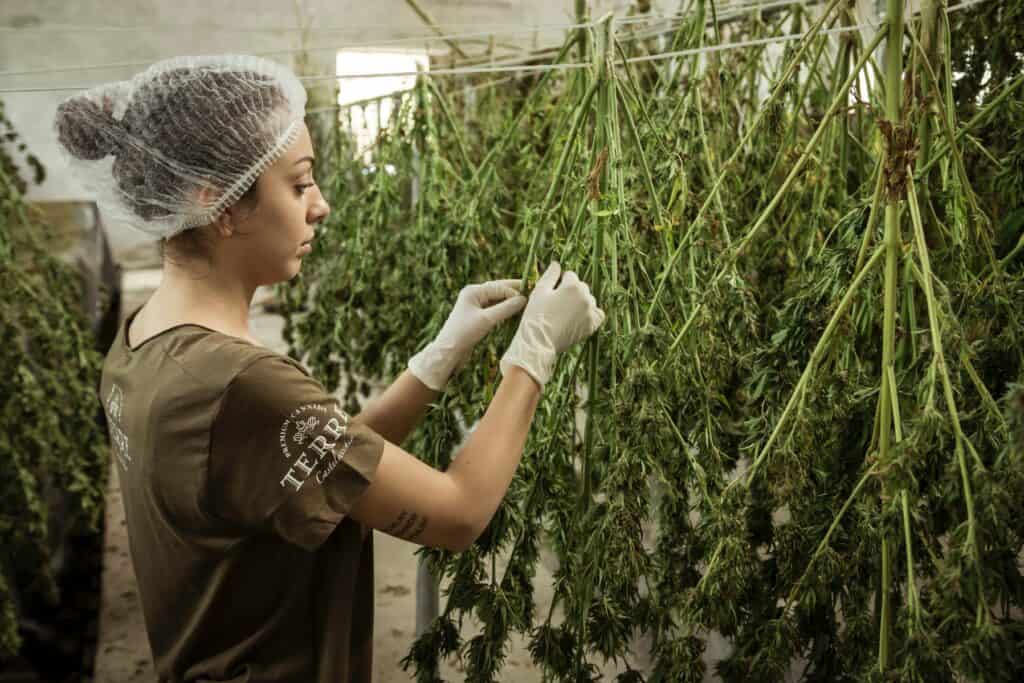
Oklahoma’s liberal medial cannabis industry continues to grow. In 2022, cannabis sales more than doubled. The job market followed suit, with the addition 6,000 new cannabis jobs—an 88% increase from 2021.
You’re most likely to find a cannabis industry job in Tulsa or Oklahoma City, but job openings are also scattered throughout the smaller cities and rural areas of the state.
Oklahoma recreational cannabis laws have been in place since June 26th, 2018. Oklahoma voters approved State Question 788 which allowed for the legal use and possession of medical marijuana. This law has opened up a variety of new opportunities within Oklahoma’s cannabis industry.
Currently, there are more than 28,000 Oklahoma residents with active medical marijuana cards that can purchase cannabis products from dispensaries located throughout the state. The Oklahoma Medical Marijuana Authority (OMMA) is responsible for enforcing Oklahoma cannabis laws and granting licenses to those who wish to become part of Oklahoma’s burgeoning cannabis industry.
As Oklahoma moves forward with its medical marijuana program, dispensaries continue to be one of the major job markets in Oklahoma related to the cannabis industry. Those wishing to become dispensary agents must meet certain education requirements before being granted a license by OMMA. A dispensary agent must complete at least 8 hours of coursework approved by OMMA every year as well as pass an exam prior to receiving their license. Once licensed, agents may assist customers in selecting appropriate types of medical marijuana products as well as providing advice regarding dosage and consumption methods.
In addition to dispensary agents, Oklahoma's booming cannabis industry offers jobs such as budtenders, growers, security personnel, product educators, and other positions related directly or indirectly to the sale of medical marijuana products such as marketing professionals and point-of-sale system technicians.
There are also numerous business opportunities available in Oklahoma related to the sale and production of hemp-derived CBD products as well as retail stores specializing in cannabis accessories such as grinders and vaporizers.
In 2023 Oklahoma’s recreational adult-use market is expected to open up providing even more opportunities for those seeking employment within the state’s burgeoning cannabis industry. Businesses looking to enter into Oklahoma’s recreational market will need to apply for an adult-use cultivation license or retailer/dispensary license from OMMA before they can legally operate within Oklahoma’s recreational market.
These licenses will come with strict regulations regarding testing standards as well as taxation requirements which all businesses entering into Oklahoma’s recreational market must adhere too in order remain compliant with all state laws governing recreational sales within Oklahoma’s borders.
Anyone looking to work in the Oklahoma cannabis industry should first enroll at Cannabis Training University to up their skills and separate themselves from applicants without proper cannabis training.
Cannabis Jobs in Pennsylvania
Although Pennsylvania’s medical cannabis program is very strict (patients aren’t even allowed to smoke cannabis flower), that hasn’t stopped the state’s medical cannabis industry from prospering! As of January 2023, the state’s cannabis industry employed 15,895 workers.
More than 7,000 of those jobs were added in 2022. The state will add 80 more dispensaries once all permits have been issued, for a total of 210 dispensaries! This makes Pennsylvania a surprisingly sweet destination for cannabis industry hopefuls.
Pennsylvania, like many states across the nation, has seen a rapid growth in the cannabis industry over the last few years. In 2023, Pennsylvania's cannabis laws have become increasingly more progressive, allowing for medical and recreational use of cannabis.
Pennsylvania is home to a burgeoning cannabis job market that is rapidly growing and creating opportunities for new employees in both medical and recreational aspects of the industry.
In Pennsylvania, cannabis consumption is legal for individuals 21 or older with a valid ID showing proof of age. Pennsylvania residents can obtain their medical marijuana card from an approved doctor if they meet certain eligibility requirements under Pennsylvania’s Medical Marijuana Program (MMP).
Those who qualify for the program are able to purchase medicinal marijuana products from dispensaries throughout Pennsylvania. Medicinal users are able to purchase limited quantities of cannabis flower, edibles, concentrates, and other related products from select dispensaries as well.
Pennsylvania’s cannabis job market has been steadily expanding over the past few years. Within Pennsylvania’s booming market there are numerous jobs available to individuals interested in working in the industry.
These include roles such as budtenders, cannabis cultivation workers, dispensary agents, extraction technicians and laboratory technicians – just to name a few!
Budtenders help customers choose appropriate products based on their needs while dispensary agents manage customer service at local dispensaries and provide guidance on different strains and products available.
Cultivation workers work in facilities where marijuana plants are grown while extraction technicians extract THC oils from plants using hydrocarbon or carbon dioxide-based machines.
Laboratory technicians test these oils to ensure they meet safety regulations set forth by Pennsylvania law before being sold in Pennsylvania dispensaries.
Cannabis businesses seeking to employ Pennsylvanians must adhere to specific rules and regulations set forth by Pennsylvania state government officials regarding employee background checks and drug testing policies for any potential candidates looking for employment within the industry.
Further, many employers require applicants possess cannabis certification or degrees relative to specific positions within the industry prior to applying for jobs as well as continual state licensing renewal processes which need to be completed regularly throughout one’s career in order to remain compliant with Pennsylvania laws relating to employee qualifications within this space.
Want to work in the Pennsylvania cannabis industry? Land a dispensary job in Pennsylvania with online training from the Pennsylvania cannabis college.
Cannabis Jobs in Other States
In addition to the top 10 cannabis states for job seekers in 2023, other states are full of opportunity too! Read on to find out about job opportunities in other US states with legal cannabis programs.
Alaska Marijuana Jobs
Despite 2021’s 20% reduction in profits across the cannabis industry due to declining tourism, cannabis sales continue to grow steadily. In fact, sales in Anchorage jumped 33 percent from 2019 to 2020.
Experts predict that sales will continue to grow steadily in the coming years. As tourism returns to Alaska, job applicants should be on the lookout for jobs in cannabis consumption lounges especially in the tourist cities of Anchorage, Juneau, and Fairbanks.
That said, it’s probably not worth it to move to Alaska just to get a cannabis job. Even adding in cannabis tourism, Alaska doesn’t support a large enough number of cannabis jobs to warrant relocation, and turnover in the jobs that are available is fairly low.
Alaska has made significant progress towards legalizing cannabis since Alaska voters approved Ballot Measure 2 in 2014, making Alaska the third state in the U.S. to legalize recreational cannabis use and sale. Alaska's Recreational Marijuana Use and Sale Initiative, known as Ballot Measure 2, allowed adults 21 and over to possess up to one ounce of marijuana and grow up to six marijuana plants for personal use on their own property.
Although Alaska is lagging behind some other states in terms of developing its cannabis industry, Alaska’s regulations are slowly becoming more open and accessible for those looking to enter the cannabis industry or seek employment in it within Alaska’s borders.
The Alaska Marijuana Control Board (MCB) is responsible for regulating the Alaska marijuana industry. As of 2021, the MCB has set regulations on a number of topics related to cultivation, manufacturing, testing and retail sales of cannabis products.
The MCB also has established rules regarding advertising, packaging, labeling and product safety requirements for all Alaska-licensed marijuana businesses. In addition to these regulations, Alaska also requires that any commercial marijuana establishment receive local approval from the municipality where it is located before applying for a state license.
As far as job opportunities within Alaska’s cannabis industry are concerned, there are a variety of different positions available depending on an individual’s skillset or expertise. From cultivation-related roles such as bud trimmers or plant technicians; to laboratory roles like lab technicians or chemists; to retail roles such as budtenders or store clerks—there is something for everyone in Alaska’s emerging cannabis sector.
In addition to traditional entry-level positions within Alaska’s cannabis sector there are also a range of executive positions available as well such as CEO’s/COO’s/CFO’s/CRO’s; Marketing Managers; Operations Managers; Compliance Officers; Quality Assurance Engineers; Regulatory Specialists; Accountants; Human Resource Specialists; Corporate Lawyers specialized in Cannabis Law; Lobbyists / Advocates etc..
At present 2023 could be an exciting period for those looking to enter or further their career within Alaska’s growing cannabis market with ongoing efforts being made by both private companies & public institutions alike towards furthering awareness & education around legal requirements & best practices within our ever evolving industry!
While there remains much work yet left undone when it comes time along with inevitable challenges that come along with any new emerging industry – it should be interesting year overall & certainly one worth keeping your eyes peeled! Anyone looking to work in the Alaska cannabis industry can better prepare for their new cannabis career with online cannabis education and training from the Alaska cannabis school, CTU.
Connecticut Marijuana Jobs
Connecticut’s medical cannabis industry currently has 18 dispensaries that serve 50,000 patients Although this number is modest, the legalization of adult-use cannabis in Connecticut is expected to revitalize the state’s limping medical cannabis market. Experts predict that the legal recreational cannabis industry will bring 5,000 to 7,000 jobs to Connecticut’s workforce in the first year of operation.
Connecticut’s adult-use business licensing requirements were posted in September 2021. Legal sales to adults began in May 2022. Expect the state’s cannabis job market to heat up in winter of 2022 and beyond.
Want to work in the Connecticut cannabis industry? Looking for a dispensary job in Connecticut? Enroll today at the Connecticut cannabis college and begin your new marijuana career!
District of Columbia Marijuana Jobs
Washington D.C is one of the Districts in the United States that has legalized cannabis for recreational, medical and adult-use purposes. As of 2021, recreational cannabis use was legal in Washington, D.C., and adults aged 21 or over can possess up to two ounces of marijuana for personal use, as well as cultivate up to six plants (with only three mature at any one time). Medical marijuana use was also approved in 2012 although legislation on this is still being finalized.
The District's cannabis laws are considered more progressive than other states, but there are many restrictions that individuals should be aware of when seeking to engage in activities related to cannabis. These include not being allowed to consume marijuana in public places or within a vehicle or boat; it must be consumed within a private residence. Additionally, it is illegal to distribute any amount of marijuana without a license.
The District also has strict regulations regarding the sale and distribution of cannabis products such as edibles and concentrates. For example, businesses are only allowed to sell up to seven grams per transaction, while individuals may possess no more than 28 grams at any given time; they may not transport cannabis across District borders nor sell it or give it away as a gift. Furthermore, all dispensary owners must obtain a license before selling products containing THC concentrations higher than 0.3%.
In terms of the District's job market outlook for those interested in entering the cannabis industry, current estimates suggest that Washington D.C will experience significant growth by 2023 due mostly to an influx of new businesses set up by entrepreneurs looking capitalize on the District’s liberal stance on marijuana laws . This could open up new opportunities for those looking to work with existing dispensaries as well as potential openings for those interested in setting up their own business ventures related to cannabis cultivation, manufacturing processes and retail sales outlets .
In addition to providing employment opportunities within the District’s existing marketplace , there is potential for further development within research initiatives aimed at understanding both medicinal applications and long-term effects associated with regular consumption of marijuana products .
Overall , Washington D.C’s current outlook regarding its cannabis laws make it an attractive destination for those wishing enter into this growing industry , offering significant opportunity both now and into the future . Anyone interested in pursuing a career in this sector will need ensure they understand all relevant regulatory guidelines whilst familiarizing themselves with current industry practices before taking their first step onto this highly competitive field. Get certified today at the Washington DC cannabis school and start a new career!
Maine Marijuana Jobs
Back in 2019, Maine’s medical cannabis industry supported only 5 dispensaries and 400 full-time jobs. The opening of the adult-use dispensaries in October 2020 blew those numbers out of the water!
Cannabis jobs and salaries in Maine have been on the rise since Maine legalized recreational marijuana use in 2017. Maine has seen a steady increase in cannabis-related businesses and job opportunities, as well as new regulations and laws governing the industry.
For those hoping to work in the cannabis industry in Maine, there are several potential job roles available. Budtenders are typically responsible for advising customers on product selection, providing accurate information about cannabis products, and accurately recording sales information.
Budtenders typically earn a mean salary of around $35,000 per year in Maine depending on location and experience. Other positions include cannabis growers, edibles makers, security guards, delivery drivers, dispensary managers, product testers, extraction technicians, trimmers and more.
In Maine home cultivation of cannabis is allowed for adults aged 21 or older. Up to six plants may be grown by an individual with no more than three mature plants at any one time.
The Maine Department of Agriculture requires all home cultivators to register with their local government before beginning cultivation. Cultivators must also follow certain guidelines such as having secure enclosures for their plants and keeping detailed records of their grow operations to stay compliant with Maine law.
Maine Cannabis laws 2023 currently dictates that only licensed dispensaries can sell or distribute cannabis products within the state. Dispensaries are subject to stringent regulations designed to ensure they operate responsibly while protecting public safety.
Maine has also implemented restrictions on advertising fees, limits on monthly purchasing amounts by individual customers based on residency status (residents may purchase up to 2 1/2 ounces per month while non-residents may purchase up to 1/2 ounce), labeling requirements for edibles and flower products sold by dispensaries, as well as childproof packaging requirements for any retail marijuana items intended for consumers under age 21.
The future promises even more growth for Maine's burgeoning cannabis industry as new laws come into effect over the coming year that will allow for social equity initiatives that promote diversity within the legal marijuana sector by providing access to opportunity for those individuals disproportionally impacted by past marijuana laws enforcement practices.
Maryland Marijuana Jobs
The cannabis industry in Maryland is booming, and the state's 2023 laws are driving even more demand for well-trained cannabis professionals. Maryland has always been a leader in progressive drug policy, and the Maryland Medical Cannabis Commission is making sure that potential industry members are properly prepared to enter the workforce.
Maryland offers numerous jobs within the cannabis industry, including dispensary jobs, budtender positions, grow house positions, and infused product creation opportunities.
Due to Maryland's favorable outlook on cannabis, there has been a steady influx of new businesses entering into the Maryland cannabis market. These businesses will need experienced and knowledgeable employees to help them succeed in their endeavors.
Budtenders typically make around $14-16 an hour depending on experience and seniority. Experienced budtenders can make up to $18 an hour plus tips depending on their work performance. Those interested in working as a Maryland budtender should have a strong knowledge of various cannabis strains as well as excellent customer service skills.
Home cultivation of cannabis plants is allowed in Maryland for medicinal purposes if one is registered with Maryland's medical marijuana program; however it is not allowed for recreational use. Individuals must be 18 or over, provide proof of Maryland residency, and have written certification from a physician approved by the state in order to qualify for medical marijuana registration.
They must also register with Maryland's MMCC registry prior to cultivating marijuana at home. Patients may cultivate up to six plants for medicinal reasons only and those plants must remain secured within their homes at all times.
The Maryland Medical Cannabis Commission (MMCC) recently proposed sweeping changes to its current regulations that would take effect in late 2023. These changes include allowing out-of-state reciprocity with other states' medical marijuana programs as well as increasing access to care by expanding list of qualifying conditions that allow individuals access to medical marijuana treatment plans they had previously been excluded from due to insufficient evidence or lack thereof related to claim efficacy of such treatments.
The proposed changes also include allowing home delivery services for those patients who cannot physically travel or live too far away from existing dispensaries; giving greater access to research studies through increased collaboration between universities, hospitals and research centers; instituting stricter labeling requirements; adding potency limits on edibles; providing legal protections for patients who remain compliant with MMCC guidelines; as well as other various initiatives meant to ensure patient safety while still promoting innovation within Maryland's burgeoning medical marijuana industry.
Get yourself prepared for a Maryland cannabis job or Maryland cannabis business with online cannabis education and training from the Maryland cannabis college of choice, CTU!
Massachusetts Marijuana Jobs
Massachusetts is set to become a burgeoning market for legal cannabis in 2023. Massachusetts has seen some of the most growth in the cannabis industry since Massachusetts legalized medical and recreational cannabis in 2016. This growth is expected to continue, with the Massachusetts cannabis market estimated to reach $2.4 billion by 2024.
The Massachusetts cannabis industry is already creating thousands of jobs, both directly and indirectly related to the industry, and this number is expected to increase significantly by 2024 as more businesses enter the Massachusetts market and expand existing operations.
With more people seeking jobs within Massachusetts’s booming cannabis industry, budtenders are becoming increasingly sought after. Budtenders make up a large portion of Massachusetts’s expanding workforce, helping fill out dispensary staffs around Massachusetts with knowledge about product selection and customer service.
In 2023, the average salary for a Massachusetts budtender ranges between $20-$25 per hour depending upon experience level, location, and if they have an accredited budtender certification. In addition to being knowledgeable about products and customer service, budtenders must also stay up-to-date on state regulations as they relate to cannabis laws in Massachusetts.
This includes staying informed about any changes that may affect consumer safety or product standards within their respective dispensaries or retail stores.
In 2023 Massachusetts residents over 21 years old will be able to cultivate up to six marijuana plants inside their home's residence for personal use only that can not be sold or given away legally under Massachusetts state law.
Those cultivating cannabis at home must follow all safety protocols when growing marijuana indoors such as proper ventilation and equipment guidelines set forth by the state health department. Home cultivators must also take into consideration any local municipality laws that may differ from statewide regulations when it comes to cultivating marijuana at home as well as any additional taxes imposed on cultivation activities depending on location within Massachusetts.
Enroll today at the Massachusetts marijuana school of choice and start your new cannabis career!
Minnesota Marijuana Jobs
Working in the cannabis industry in Minnesota in 2023 means that you have a chance to get involved with one of the fastest-growing industries in the country. Minnesota is one of many states that has legalized cannabis, which means there are a variety of job opportunities available.
Whether you're looking to become a budtender, work in cultivation and production or provide services related to retail sales and distribution, Minnesota has many jobs available for those looking to break into the newly legalized industry.
The average salary of budtenders in Minnesota starts around $14 per hour, but can rise up significantly depending on experience and qualifications, such as earning a budtending certificate from CTU online.
Budtenders are responsible for recommending products, offering advice on use and helping customers navigate through dispensary menus. As such, having excellent customer service skills is essential for anyone interested in becoming a budtender in Minnesota. In addition, budtenders must also be knowledgeable about cannabis strains, use methods and state regulations regarding marijuana sales.
When it comes to home cannabis cultivation, Minnesota allows medical patients with legal registration to possess up to 1.5 ounces (42 grams) of cannabis for personal medical use and may grow up to 12 plants if they do not live within 40 miles of a registered medical marijuana dispensing facility. While recreational users are not allowed to grow their own cannabis plants at home, Minnesota is part of an increasing number of states taking steps towards legalization as more people see cannabis as an accepted form of medicine and recreation.
Overall, working in the Minnesota cannabis industry presents plenty of opportunities for those interested in this fast-growing sector. With an increasing number of businesses recognizing the potential benefits that can come from investing into this burgeoning industry, job growth is expected to continue steadily into 2023 and beyond.
For aspiring budtenders specifically, excellent customer service skills coupled with knowledge about state regulations can be instrumental when seeking employment opportunities within this field.
Looking to start a cannabis business in Minnesota? Enroll today at the Minnesota cannabis school of choice and start a legal cannabis career.
Nevada Marijuana Jobs
The Nevada cannabis industry is projected to grow significantly in 2023. Nevada, known for its legalized recreational cannabis, is poised to become a major player in the nation’s cannabis market.
Nevada has some of the most progressive marijuana laws in the nation and provides a wide range of opportunities for those who want to pursue careers in this growing area.
In Nevada, budtenders are highly sought after and can expect to see an average salary of $43,000 annually. As Nevada's marijuana market continues to expand, job opportunities in the state will also increase. Budtenders take on a variety of roles and serve as bud-experts for customers interested in purchasing cannabis products.
They provide excellent customer service and are responsible for helping customers find the perfect product and educating them about it.
Those interested in working at a Nevada dispensary must first obtain an agent card from Nevada's Bureau of Cannabis Control (BCC). This ensures that workers are qualified and have knowledge about cannabis laws and regulations within Nevada.
Once approved, individuals can begin their career as a budtender. To remain up-to-date with Nevada’s marijuana laws, budtenders must be sure to complete additional training sessions related to Nevada’s BCC regulations over time.
Nevada allows home cannabis cultivation of up to six plants per person or twelve plants per household so long as they are kept out of sight from public view; however, Nevadans cannot purchase seeds or clones from dispensaries nor can they sell products they have cultivated at home — these activities remain illegal.
Dispensaries may only purchase wholesale flower or other products directly from licensed cultivators or manufacturers with an approved Recreational Marijuana Establishment license type issued by Nevada's BCC under current law..
With Nevada’s expansive marijuana laws continuing to evolve each year, more job opportunities will be available than ever before for those looking for work within this sector in 2023 — giving individuals ample opportunity to get involved in one of the fastest-growing industries today!
Enroll today at the Nevada marijuana college and learn how to grow cannabis and legally start a cannabis job or business in Nevada!
New York Marijuana Jobs
The cannabis industry in New York is expected to grow exponentially in 2023, with New York becoming the latest state to legalize recreational marijuana usage. New York’s new legalization of marijuana will create thousands of job opportunities for those interested in working in the cannabis industry.
With New York becoming one of the most progressive states when it comes to marijuana laws and regulations, there will be a variety of career paths available for individuals looking to enter the cannabis industry.
One type of job that is expected to become popular as New York’s cannabis industry grows is budtenders. Budtenders are responsible for providing customers with information on different strains and products as well as helping them make selections based on their preferences.
Budtenders typically receive an hourly wage between $18 and $20 depending on experience and location. Some employers may also offer additional compensation such as tips or bonuses depending on performance.
In New York, home cannabis cultivation is currently allowed under certain circumstances, such as if you have a valid medical recommendation from a certified physician or are registered with New York’s medical marijuana program (MMJ).
Individuals who choose to cultivate cannabis at home must adhere to specific guidelines set forth by New York State law and must follow all applicable local ordinances. Home cultivation allows individuals the opportunity to produce their own flower instead of relying solely on products available through dispensaries or other retail outlets.
Overall, working in New York’s burgeoning cannabis industry can be an exciting and rewarding career path for those interested in pursuing jobs related to marijuana use and production. From budtenders, marijuana growers, cannabis extractors and more, there are a wide range of job opportunities available throughout New York’s expanding legal marijuana market.
Those interested should research all local laws before applying for any positions related to the cannabis industry in order to ensure they are following all necessary regulations and procedures associated with New York's evolving marijuana laws and regulations.
Cannabis Job Search Tips For 2023 and Beyond

As we’ve discussed, the cannabis industry experienced fantastic growth in 2020 through 2022—despite the global pandemic. That will continue into 2023 and beyond.
But what can you do to ensure your place in this growing industry?
Learn the rules. In some areas, people with prior marijuana possession charges are barred from entering the cannabis industry. In other areas, employers can disqualify candidates who fail a drug test for cannabis.
Conversely, some states have passed measures that prohibit employers from testing new hires for cannabis. Other states have introduced social equity programs that make prior cannabis convictions a plus when looking for a cannabis job!
The takeaway is that you need to learn the local laws before you apply for a job! Knowing whether your prior convictions or status as a cannabis user will help or hurt your chances of employment is key to landing a cannabis job. Once you’re informed, you’ll be ready to take the steps you need to pass a blood test or expunge your record—or not!—before you apply.
Get credentials. Nowadays, a passion for cannabis might not be enough to get you the cannabis job you want. To outshine other candidates, you need to learn real, relevant, job skills.
The best way to get credentials is to sign up for a cannabis training course. Consider enrolling in Cannabis Training University’s online cannabis college to learn from the best of the best in the business.
Update your resume. Cannabis-industry resumes and interviews can be particularly tricky to write. Does your home-grow experience count for anything? How do you talk about experience you got while living in a prohibition state? Will any non-cannabis skills help you land the job?
CTU’s Careers cannabis classes (included in all of our certification programs) answer these questions and more. Learn how to write a resume, customize your cannabis cover letter, and ace the interview for a cannabis job. CTU even provides templates you can use to write a killer resume and cover letter that highlights your training and credentials.
Find your job. In the current market, the best place to look for cannabis job listings is through major online job boards like Indeed, Glassdoor, Monster, ZipRecruiter, Marijuanajobfinder and LinkedIn. Cannabis-specific recruiters like Vangst can also be a good resource for cannabis jobs.
That said, the best way to actually land a cannabis job is to first earn cannabis certifications from Cannabis Training University and then network, network, network! Cannabis job seekers should attend as many cannabis networking events, industry business expos, and local B2B meet-ups as possible.
“
There are over 300,000 jobs in the cannabis industry. CTU trained me for one of them!

Makes $24.50 @ THC +
At these events, you can rub elbows with cannabis hiring managers, stay up-to-date about the industry, and ultimately, score a cannabis job.
Top 6 Cannabis Job Salaries:
Marijuana Grower Jobs
Marijuana growers earn on average $60,000 to over $1 million annually.
These figures vary greatly based on which state the grow is located in, how many plants are grown, and how the laws are as far as legally selling cannabis that is cultivated.
Some of the best states to make a good living growing marijuana in are:
California, Oregon, Arizona, Colorado, Illinois, Maine, Michigan, Massachusetts, and Oklahoma.
When looking at cannabis job salaries being a marijuana grower is the most sought after position by cannabis career applicants.
To learn how to grow marijuana it is suggested to sign up for an online cannabis college. Learn everything you need to know about growing weed step by step.
Dispensary Owner/Operator Jobs
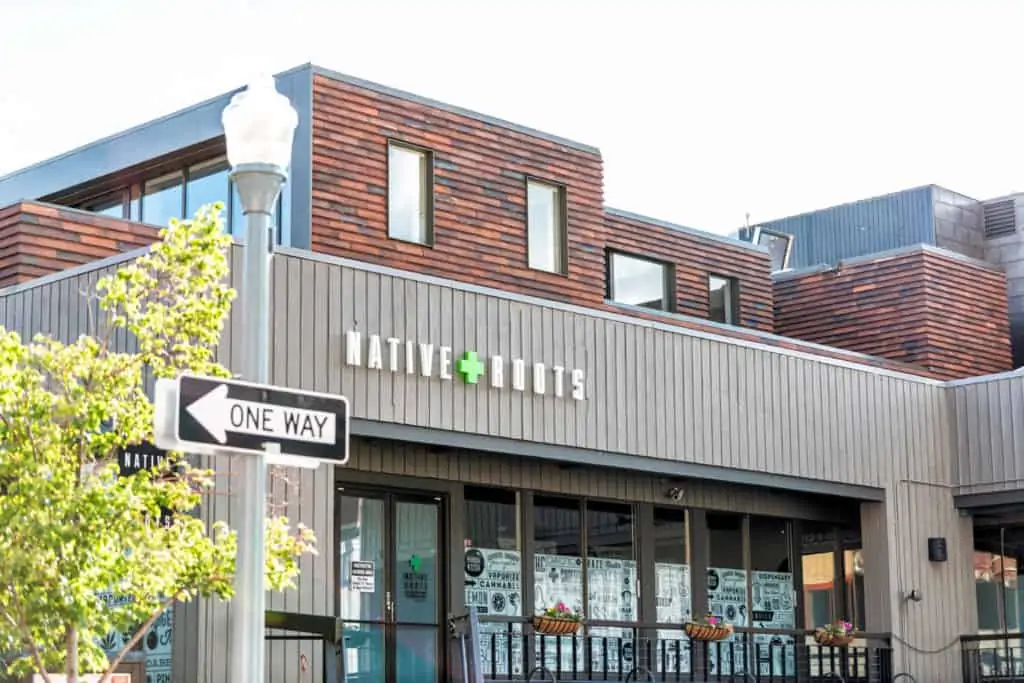
Cannabis job salaries are sometimes topped off by dispensary owners. In some instances, cannabis dispensary owners earn well over $1 million annually
For example, Harborside Medical dispensary in San Jose, California reportedly does over $20 million in annual sales.
Dispensary Manager Jobs
A dispensary manager earns on average between $60,000 and $150,000 per year.
Dispensary managers are responsible for the day-to-day operations at medical marijuana dispensaries, or even at recreational cannabis stores. Dispensary managers are often hired from within after starting as a budtender or cannabis trimmer.
Marijuana Edibles Chef Jobs

When looking at cannabis job salaries the position of marijuana edibles chef comes up as one of the most popular positions in the cannabis industry.
A marijuana edibles chef on average earns between $40,000 and $90,000 a year.
Salaries depend on how big of a company they are employed by. How many cannabis edibles they create and sell. How many dispensaries carry their line of edibles.
To learn how to cook with cannabis and start your own cannabis edibles business it is best to do so online.
Budtender Jobs

Budtender's earn on average $41,200 to $52,000 per year. Budtender jobs are very competitive and only the most educated applicants are usually chosen.
Budtender's are responsible for choosing cannabis strains for medical marijuana patients, as well as customer service and patient education.
Budtending is one of the most popular marijuana jobs. Budtenders are most often found in: California, Colorado, Oregon, Washington, Maine, Michigan, Massachusetts, Rhode Island, Nevada, and soon to be many others.
Marijuana Trimmer (Bud Trimmer Jobs)

Marijuana trimmers make on average $15 to $18 per hour, although some of the best cannabis trimmers can earn over $30 an hour.
These trimmer jobs are most commonly found in California, Colorado, Washington, New Mexico, Nevada, Michigan, Massachusetts, Rhode Island, Oregon, and Maine.
Although the need for cannabis trimmers is expected to steadily clim each year and grow to many more states.
Cannabis trimmers are also often hired in Canada, Spain, and Australia.
*Cannabis job salaries vary greatly based on which state you live in and which cannabis company you are hired by.
Cannabis Industry Benefits Packages
Cannabis companies aren’t just paying higher salaries than comparable jobs that are not in the marijuana industry. They’re also providing benefits packages, too!
Cannabis companies are rapidly reaching and exceeding national averages in vision, dental, and 401(k) plans.
77.9 percent of companies offered paid time off. 59.6 percent offered vision plans. 69.2 percent provided medical plans. 65.4 percent provided dental plans. 19.2 percent had 401(k) plans for employees. 22.1 percent had stock options. 28.8 percent had disability plans and only 13.5 percent had no perks.
Colorado Marijuana Industry Salaries
Colorado’s developed and robust medical and recreational cannabis sector is primed for expansion with new job opportunities. In Colorado, a master extractor can earn up to $70,000 a year.
Trimmers can earn more in Colorado than most states. Trimmers in Colorado can earn around $13 to $16 per hour. An experienced trimmer in Colorado can earn more than $2,000 more than a trimmer in Washington over the course of three months.
Budtender hourly pay in Colorado is about $15 per hour on average based on data from Indeed. Common budtender benefits include store discounts, paid sick time, and flexible schedules. A marijuana grower’s average salary in Colorado reaches $51,000 and up to $73,000 a year.
Cannabis Salaries In Canada
Cannabis job salaries aren’t just hot in the United States. Canada’s bustling legal adult-use marijuana market is becoming profitable and cannabis job salaries are higher compared to the average job in Canada.
A November 2022 report released shortly after legalization by Statistics Canada found that cannabis-related jobs pay $29.58 per hour compared to the Canadian average of $27.03 per hour.
In terms of annual wages, that’s a difference of $5,304. Based on those numbers, a cannabis-related job in Canada pays about $61,526 each year. The average Canadian job pays $56,222 per year.
Cannabis industry salaries can even exceed six figures. For example, British Columbia’s Liquor and Distribution Branch has listed positions reaching up to $112,000 a year.
Other notable positions listed in government databases include Compliance Auditor, Product Consultant, Cannabis Harvester, Social Media Specialist, and Technical Security Officer.
While cannabis cultivation is big in Canada, other cannabis sectors that are hiring include educational services, health care, and retail shops.
Based on Statistics Canada’s report, the highest level of marijuana-related employment was in Ontario with an estimated 5,700 jobs as of Nov. 2022. These numbers are expected to steadily rise in 2023 and beyond.
Cannabis Cultivation Jobs In Canada
Canada’s agriculture industry is seeing enormous gains from cultivating cannabis. A survey conducted by Cannabis At Work found pay scales for cannabis cultivation jobs are increasing faster than other jobs in the marijuana market.
According to CEO Alison McMahon, job salaries for cultivation manager, quality assurance, processing assistant, and cultivation technician have gone up. Some cultivation-related job salaries have even increased by 14 percent.
A quality assurance position in Alberta could earn an average of $103,000 a year. Master growers in Canada can expect about $81,000 annually. Despite the need to fill cannabis cultivation positions, applicants need job training to stand out.
One of the biggest Canadian producers is Aurora Cannabis. According to job descriptions, Aurora Cannabis’ annual marijuana salaries include the following:
- Store Manager: $49,000-$67,000
- Assistant Store Manager – $37,000-$53,000
- Quality Assurance Auditor – $56,000-$77,000
- Store Associate – $35,00-$44,000
- Supervisor, Packaging – $49,000-$69,000
Cannabis Job Salaries Overview
United States:
- Budtender: $35,000 – $45,000 annually.
- Cultivation Technician/Grower: Entry-level positions can start around $40,000 – $50,000 annually, with experienced or master growers earning $90,000 – $120,000 or more.
- Extraction Technician: $40,000 – $70,000 annually.
- Dispensary Manager: $50,000 – $85,000 annually.
- Compliance Officer: $45,000 – $75,000 annually.
- Edibles Chef: $50,000 – $80,000 annually.
- Sales Representative: Base salary ranges from $30,000 – $50,000, with potential for commission.
- Trimmer: $35,000 – $45,000 annually or hourly/piece-rate.
- Quality Assurance: $50,000 – $90,000 annually.
Canada:
- Budtender: CAD $30,000 – $40,000 annually.
- Cultivation Technician/Grower: Entry-level is CAD $40,000 – $50,000, and experienced growers can earn CAD $80,000 or more.
- Extraction Technician: CAD $40,000 – $60,000 annually.
- Dispensary Manager: CAD $50,000 – $70,000 annually.
- Compliance Officer: CAD $60,000 – $90,000 annually.
- Edibles Chef: CAD $40,000 – $60,000 annually.
- Sales Representative: The salary varies widely but might range from CAD $40,000 to CAD $100,000+.
- Trimmer: CAD $25,000 – $35,000 annually or paid by weight/hourly.
- Quality Assurance: CAD $60,000 – $100,000+.
Worldwide:
The worldwide cannabis industry's salary figures can vary significantly due to differences in local economies, the legal status of cannabis, market maturity, and cultural attitudes towards cannabis.
However, a general trend is that in countries where cannabis has been recently legalized, the job market may see higher salaries initially due to a limited talent pool and the novelty of the industry. Over time, as markets mature and more people enter the field, salaries could stabilize.
Remember, the cannabis industry's dynamic nature means the specifics can change year by year. For the most up-to-date figures, consulting industry-specific salary surveys or reports in the respective countries would be the best approach.
How Online Courses and Certifications from CTU Can Help:
- Foundational Knowledge: For those new to the industry, online courses provide a foundation in key areas, from understanding different cannabis strains and their medicinal benefits to grasping the legal intricacies of the cannabis market in different jurisdictions.
- Specialized Skills: Many cannabis positions, such as budtenders or cultivation technicians, require specialized knowledge. Certifications can demonstrate proficiency in these areas, potentially giving job applicants an edge over the competition.
- Credibility: Completing coursework and earning certifications from a recognized institution like CTU can boost your credibility, showing potential employers or business partners that you've invested in your cannabis education.
- Networking: While online courses are primarily about knowledge acquisition, they can also offer networking opportunities. Interacting with instructors, attending virtual seminars, or participating in forums can connect you to industry professionals and fellow students.
- Business Acumen: For those aspiring to start their own cannabis business, understanding the nuances of the market is crucial. Courses on cannabis business operations, regulatory compliance, and marketing strategies can provide a roadmap to launching and sustaining a successful venture.
- Flexibility: Online courses offer a flexible learning environment, allowing you to study at your own pace and on your own schedule. This can be particularly beneficial if you're looking to transition into the cannabis industry while currently employed elsewhere.
- Cost-Effective: Compared to traditional educational settings, online cannabis courses can be more cost-effective, offering comprehensive content at a fraction of the price.
In conclusion, as the cannabis industry continues to grow and mature, the demand for educated professionals will likely increase.
Online courses and certifications, like those offered by Cannabis Training University, can serve as a stepping stone for those aiming to secure a position in the field or launch their own cannabis venture. They not only provide knowledge but also help in building credibility in the eyes of potential employers or business partners.
How to Get a Job in the Marijuana Industry
Anyone interested in finding a marijuana job or starting a cannabis business will benefit from online training at the best marijuana college, Cannabis Training University.
Start a cannabis career or marijuana job with online cannabis training at the industry-leading and only internationally accredited marijuana school.
With a maturing industry comes stricter job qualifications. To land that perfect cannabis job, you’ll need dedication and verifiable credentials. You can get the certified and accredited credentials you need at Cannabis Training University.
Take the first step towards your new career! Join many thousands of satisfied cannabis professionals around the world. Sign up for CTU cannabis certifications program today!

Jeff Zorn
Jeff Zorn, a collegiate basketball player, discovered the transformative power of medical cannabis after a significant injury. He founded Cannabis Training University (CTU), a groundbreaking institution dedicated to disseminating comprehensive information about the cannabis industry. With a team of skilled educators and faculty members, CTU has reached thousands of students worldwide. As an esteemed cannabis business expert, Jeff regularly contributes thought-provoking articles online, providing invaluable guidance to aspiring entrepreneurs. CTU has grown from a single student in 2009 to a global phenomenon with over 80,000 students.


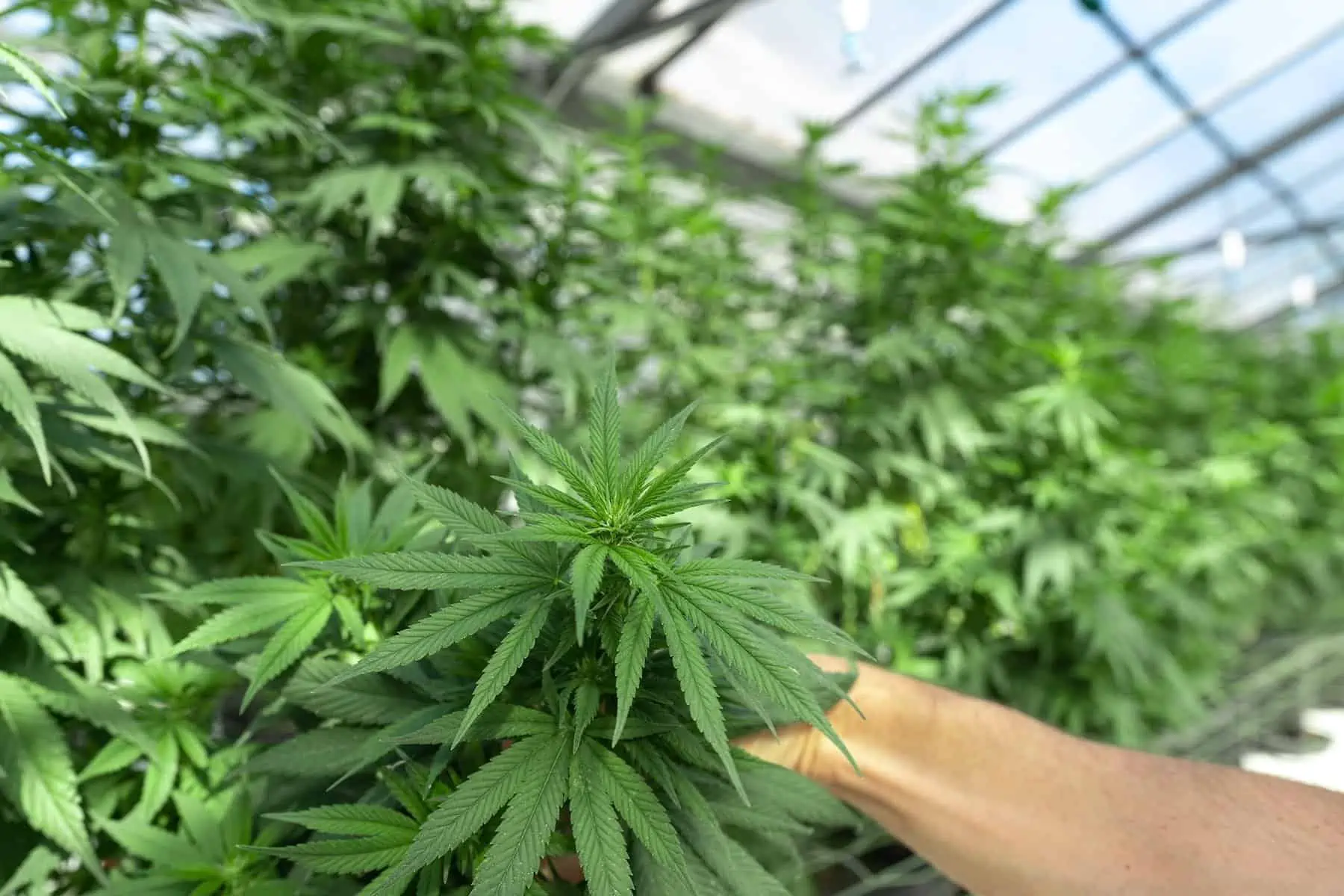





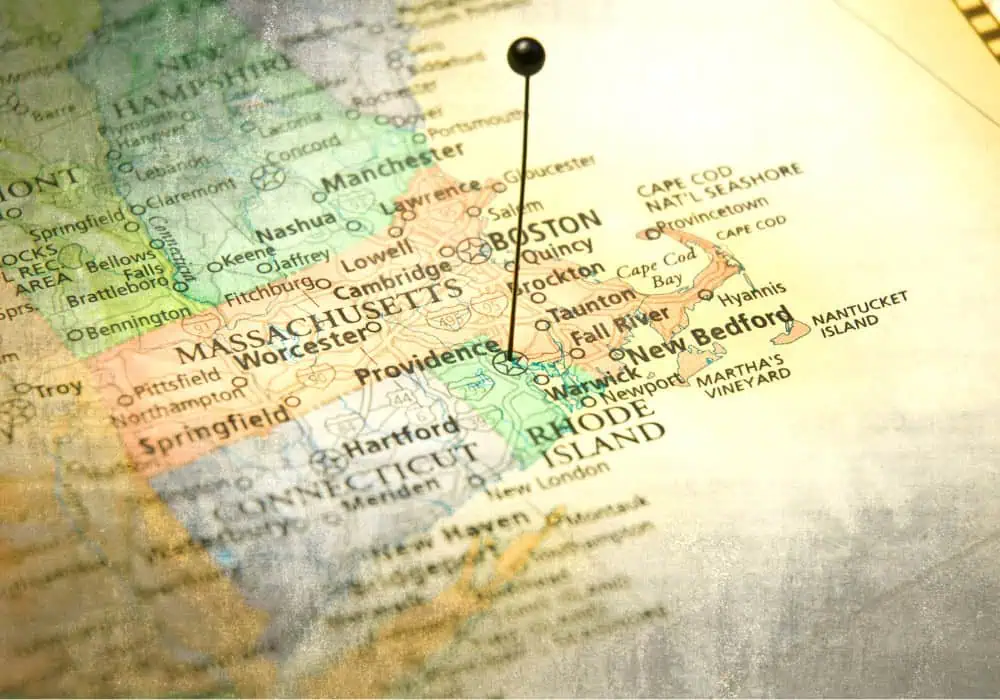



 Jeff was involved in an accident where he endured a traumatic brain injury. He had a week-long stay in ICU where brain surgeons
Jeff was involved in an accident where he endured a traumatic brain injury. He had a week-long stay in ICU where brain surgeons  100% risk free money back guarantee within 48 hours after purchase if student has not completed any of the courses or exams.
100% risk free money back guarantee within 48 hours after purchase if student has not completed any of the courses or exams.